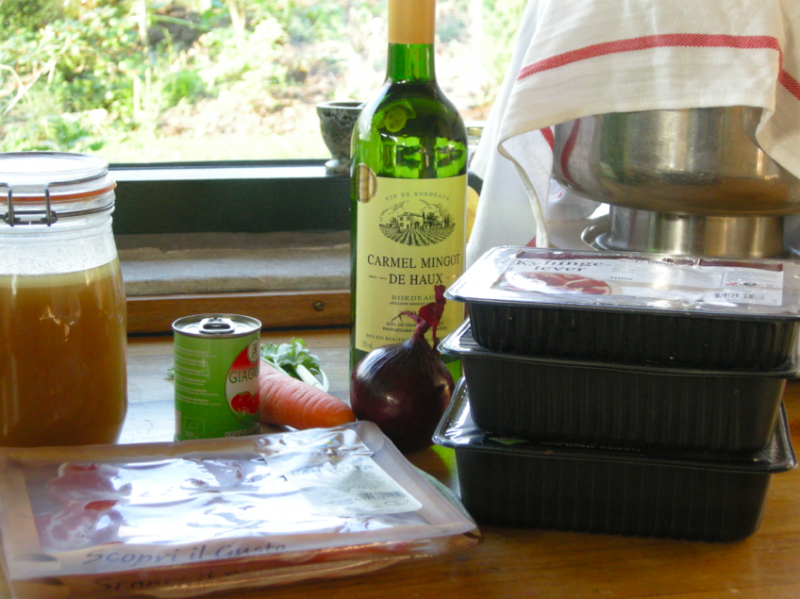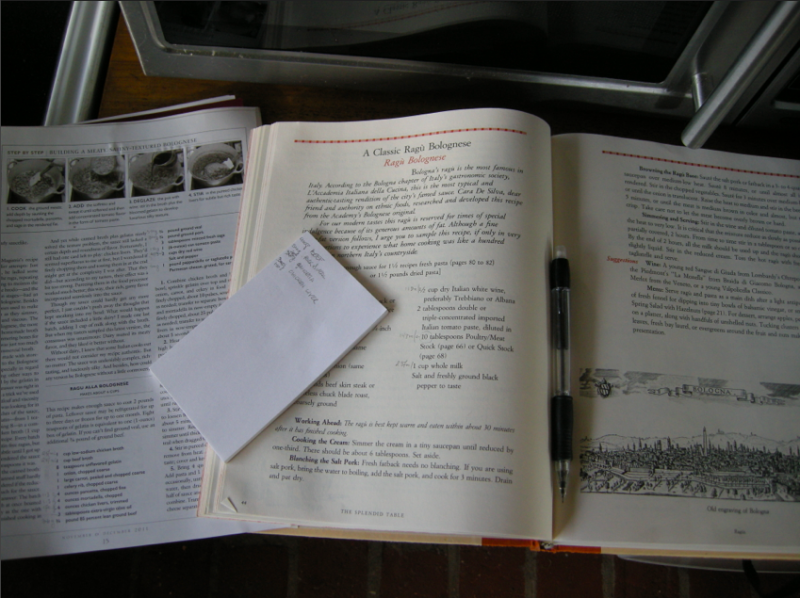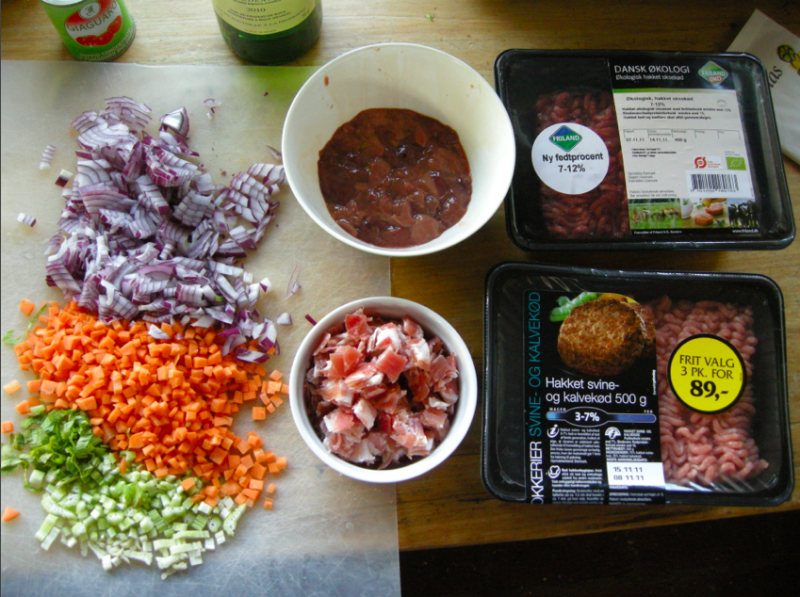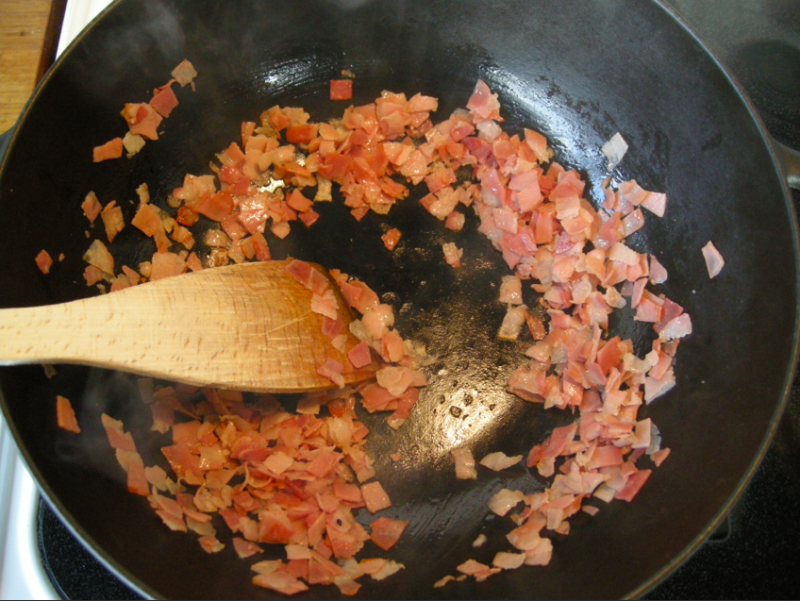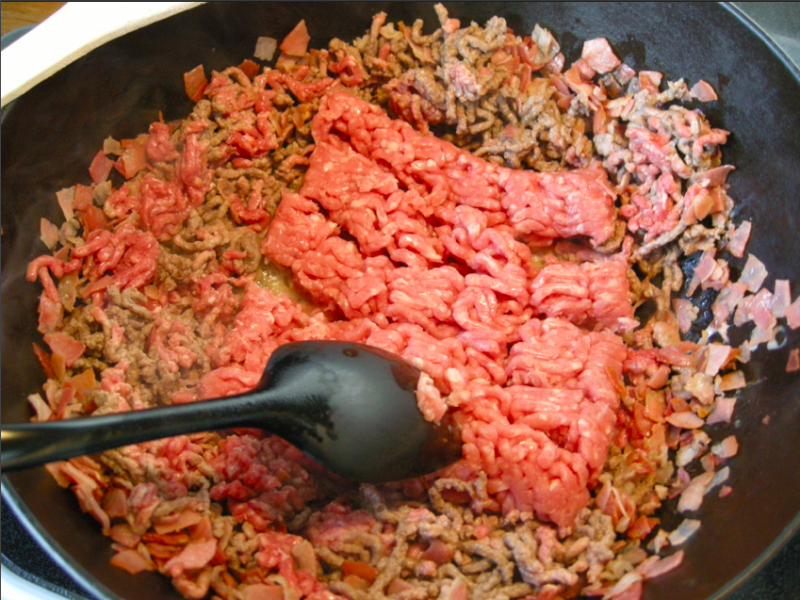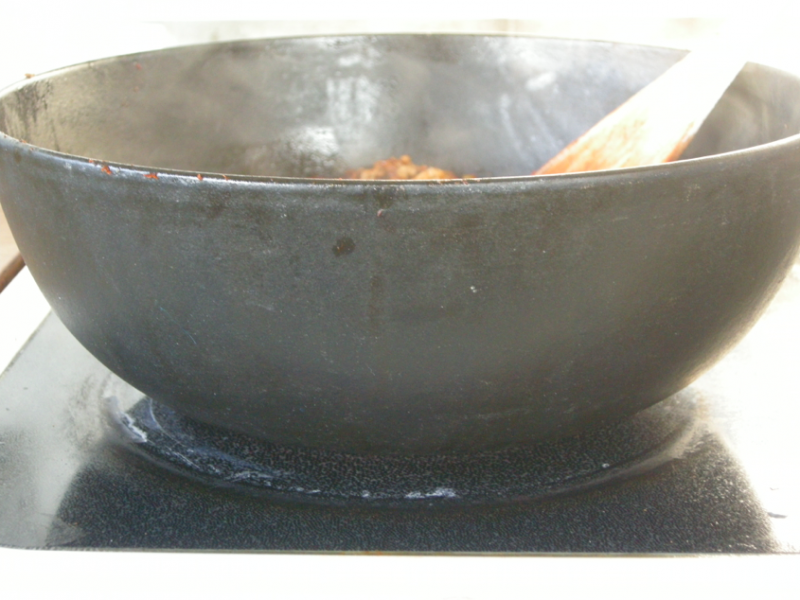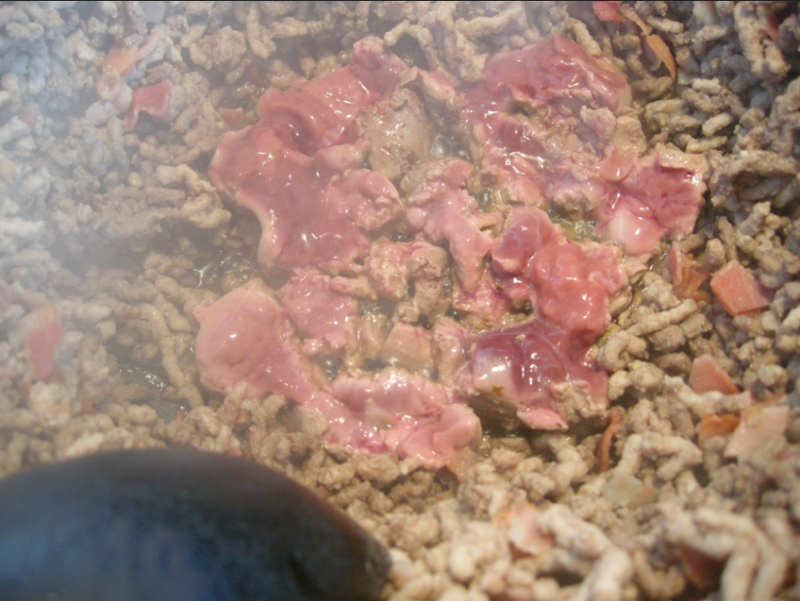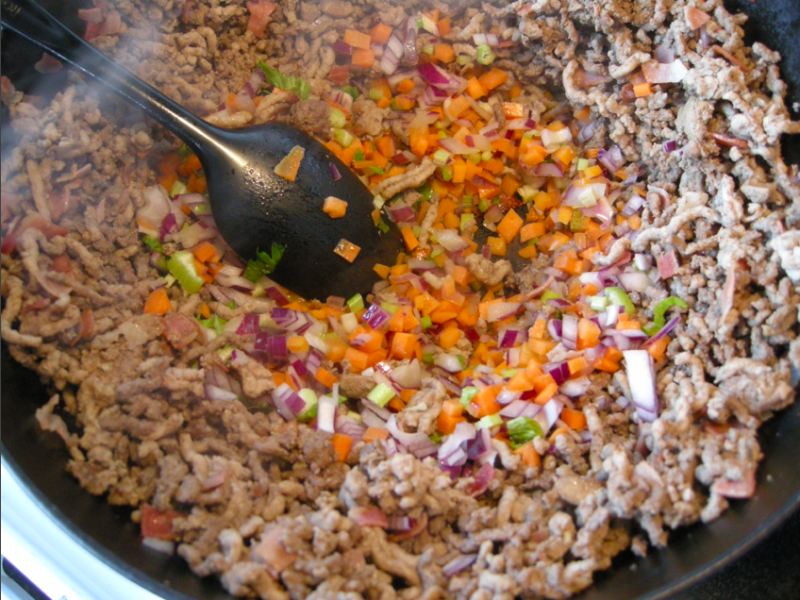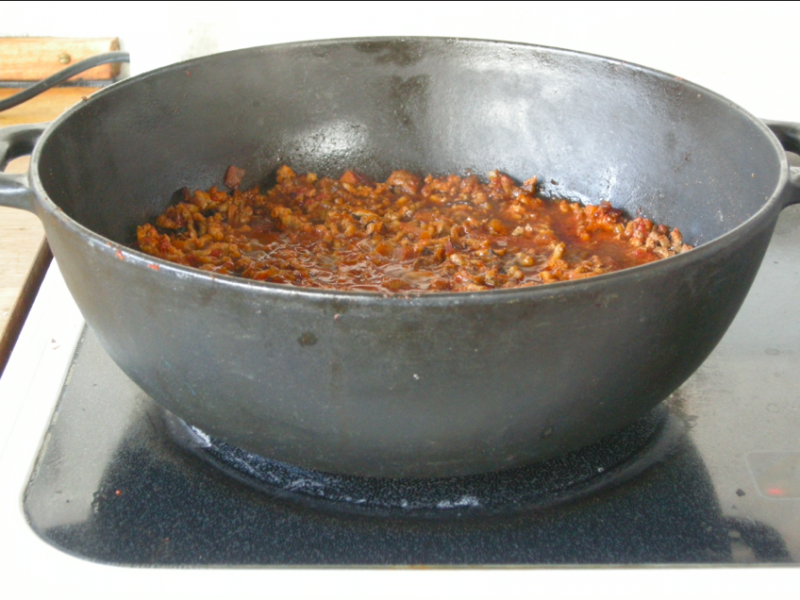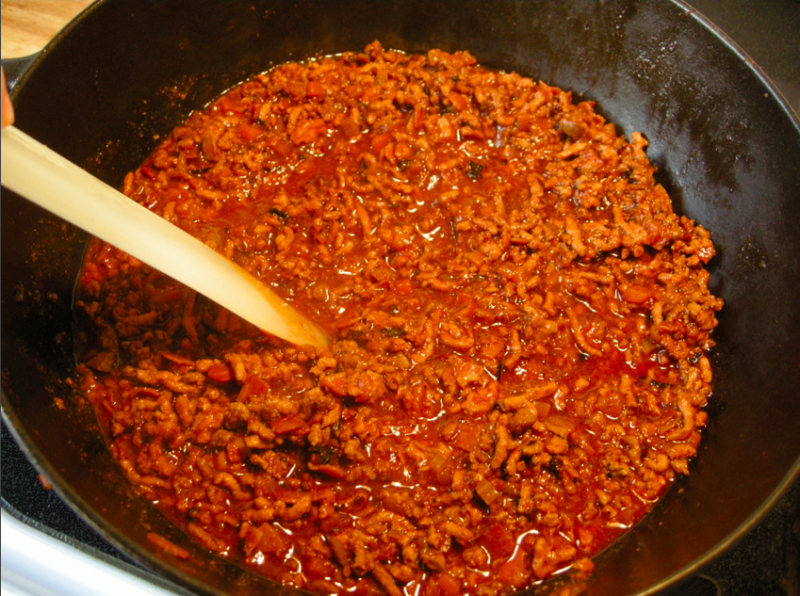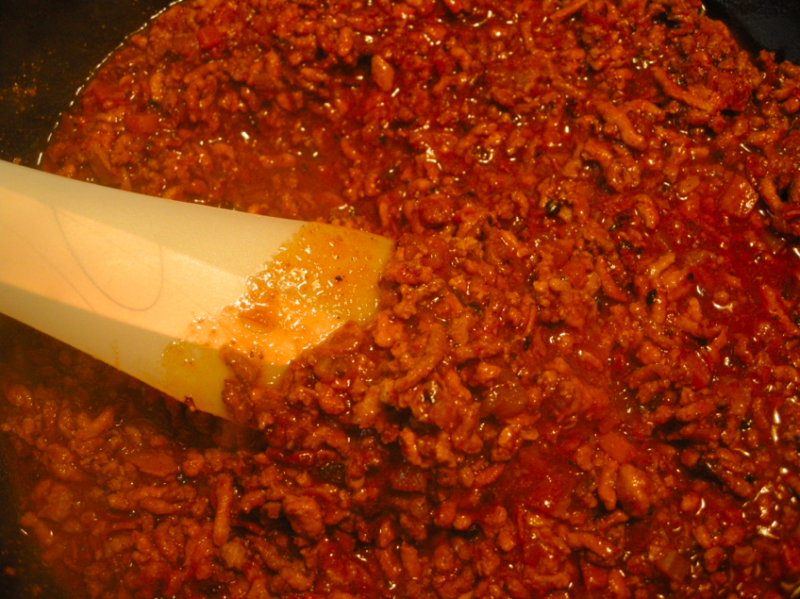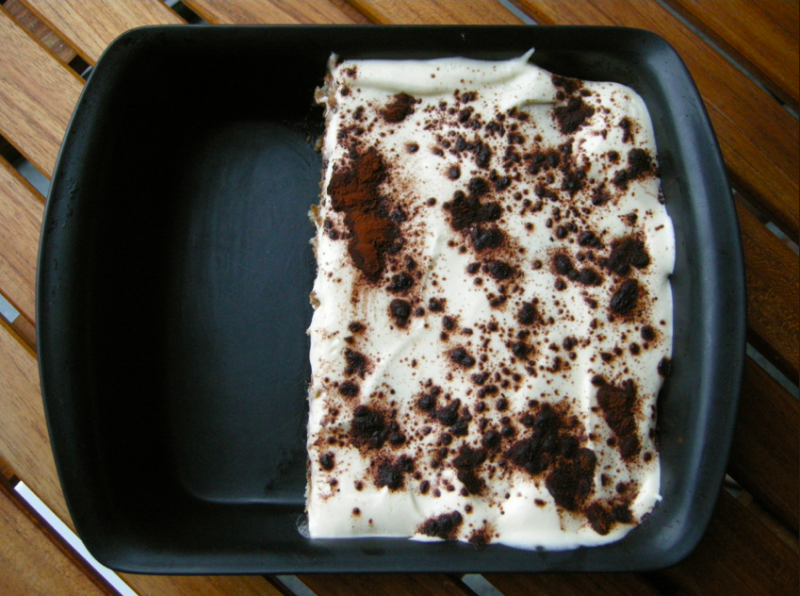-
Posts
7,674 -
Joined
Content Type
Profiles
Forums
Store
Help Articles
Everything posted by Mjx
-
It's what was on hand. My boyfriend was sweet enough to do the shopping for this (I was racing to meet a deadline), so I made the list as loose and flexible as possible, so I'd have some form of everything I needed. Incidentally, the clove is apparently only noticeable if you're told about it, and sniff for it; the predominant note is liver, which I haven't decided whether or not I like.
-
This time, I decided to combine Rossetto Kasper's presentation of the traditional recipe in The Splendid Table with some of the ideas from Cook's Illustrated's interpretation (which involves chicken liver and gelatine), along with my own logic at any given moment (the last broke down in several places). Raw ingredients, in order of appearance in the pot: 210g pancetta (7.4 oz), 400g beef (14.1 oz), 500g pork and veal blend (17.6 oz), 150g chicken livers (5.3 oz), a clove, a large carrot, a celery stalk, a medium onion, 70g tomato paste (2.5 oz), 250mL white wine (about a cup), 1L chicken stock (a little under a quart; reduced last night from 2L). I'm doing this in my boyfriend's parents' kitchen (we're staying with them while we're house hunting), so I knew this would alter my usual approach. I'd originally planned on unpacking the 30cm, straight-sided, deep stainless skillet I normally use, then realized it is much too large for even the largest burner on the stove, so went with a heavy cast iron pot, instead; the only other choice that was even close to large enough was a skillet that was way too shallow to contain the ingredients. I wanted to work with the fat in the meat, adding as little extra as possible, so I decided to start by sautéing the pancetta Then I added the beef, and pork and veal mix. Because the pot is very curved, and has a relatively small base, the fluid from the meat accumulated over a quite small area, throwing off clouds of steam (also made taking pictures a little challenging). I didn't want to steam/boil the meat before it browned, so I pushed the meat to the sides of the pot, and cooked off the liquid, until only fat remained, then, in the clear space at the centre, I sautéed the livers, which I then mashed up with a fork. I stirred the meat together. It was at this point that I realized that unless I was willing to give it a very long time with constant vigilance over a fairly high heat, it was never going to really brown, because relatively little of the volume was in contact with the pot at any given time, and very little of the pot was in contact with the heat. At this point, my boyfriend's father began his daily trumpet practice. He decided that he would not practice in the kitchen as usual, and moved to another room, but my boyfriend's mother stayed in the kitchen and sang along, so I wouldn't miss out. I pushed the meat to the sides of the pot again, saw there was very little fat, added a little olive oil, and then added the carrot, celery, and onion. As I did this, I realized it was an idiotic and lazy move: Naturally, as I began stirring the vegetables, the meat continuously crowded them, and tumbled in amongst them. I carried on regardless, since there seemed to be no other reasonable option at that point. My boyfriend wandered into the kitchen, grinned, and asked whether there was anything he could do; I demanded port. I continued mucking about with the sauté until the onions looked translucent, then tumbled everything together. My boyfriend returned with the port, which I drank while staring at the anaemic-looking mass in the pot. At this point, I decided to take heart from the fact that peposo (where raw beef is simply boiled for hours with tomatoes and water) comes out just fine, even in the absence of any browning: I'd just start adding the liquid, and hope for the best. I added about 70g tomato paste, 250mL of wine, and 375mL broth (Time=12.12). I continued adding enough broth to just be visible at the surface of the meat, at roughly half-hour intervals. According to the discussion in Cook's Illustrated, dumping all the broth in at one go works just as well as adding it at intervals, but I was using a litre of of broth, rather than 2 cups, which I felt would make a difference. A little over three hours later, all the broth had been added, and the liquid was reduced to the point that, if I was planning on adding gelatine I should probably do it now. I scooped through it and decided that a bit more cohesiveness mightn't hurt, so I added 17g of gelatine, about half the amount recommended in the Cook's Illustrated version, but given the presence of two litres of reduced broth, it seemed a safe decision. I also added a large pinch of nutmeg and a about 23 grinds of coarsely-ground black pepper, because the distinct livery/gaminess seemed to call for a something to balance it out. Time=15.33: The ragu is meaty, unctuous, and too intense to eat straight, which I find usual for this sauce. No picture of this over pasta, because I've been asked to make salmon for dinner tonight (not entirely pleasing to my boyfriend, who wanted to know why he'd been left out of this decision), but I'll add that as soon as it happens.
-
Dishes always evolve, but, beyond a certain point they become something else, so they outgrow the original name. But rather than think in terms of feeling obligated to call it a name that says it's almost-but-not-quite bolognese, it makes sense to think in terms of one now having the privilege of calling it something else, say, 'ragù Ross' My bolognese is simmering away the last of the broth. It smells distinctly livery (I used chicken livers), which makes the clove and bay leaf more important, I think. I'm still pondering the use of gelatin.
-
I find the sauce so intense, it is difficult for me to perceive it as bland, and I wonder whether the 'blank slate' aspect of the seasoning doesn't also simply tempt people to play with that aspect of it. I mentioned upthread that for me, this is a very medieval-feeling sauce, and accordingly, a clove and a bay leaf find their way in. Their presence is unobtrusive, but seems to mesh nicely with a certain gamey quality of bolognese. Sounds to me like another version of using a sweet note in a dish involving game. Haven't seen this particular version before, but sweet preserves often show up, and also grape must. Unless the quantity of cream exceeds that traditionally used, it doesn't make the sauce creamy, because it (and the milk) is cooked down for so long. That said, I find versions with cream a bit... dull, but this may be at least partly attributable that to the fact that I find the concept of dairy in a savoury dish really, really off-putting (and, since the traditional arguments against using dairy in bolognese are as strong as those for it, I won't be using any when I make the sauce a little later today).
-
The recipe with ginger may need tweaking to suit your husband's taste, but the basic idea sounds very good; spices always seem to work really nicely with nuts. Fruit flavourings (as in extracts or juices), not much, although small pieces (i.e. not larger than the nut pieces) of dried fruit can be really good. Or maybe well-crushed coffee beans or cacao nibs?
-
Never heard of sugar bloom, does it look very different from fat bloom? And, given that chocolate has no water (since the fluid phase of it is a far), it doesn't seem likely that it could absorb any, unless the fat migrates out, leaving the solids better able to pick up; is this it, or is there some other mechanism? From a physical/chemical standpoint, I can't figure it any other way, and the only chocolate I've ever had play up on me (in a way that sounds similar to this) was thin, and very heavily bloomed, and stored in a nice warm cabinet over the oven (I've only once had a damp kitchen, but quite a few that had not a single cool corner).
-
End grain boards look really nice, but Cook's Illustrated's test a few months back demonstrated that they went to hell pretty quickly; if you're planning on replacing them fairly often, however, that wouldn't matter.
-
My question now is, if you were say, going to stay with a friend who happened to have no cookbooks or ability to cook (but did have an appreciation of good food), so you were going to bring a cookbook of your own--only one--and do any cooking, would The Family Meal: Home cooking with Ferran Adrià be one you'd consider bringing? I realize the situation I've described is absurdly contrived (if no weirder than some I've found myself in), which is the reason I'm saying 'one you'd consider', not 'the only/first one I'd choose'
-
Fair enough, and as you point out, it's a very personal thing. I don't have a dozen cookbooks, and the ones I have are either very old, or incredibly reliable. Also, I travel/move often, and my books are some of the few things with which I'm unwilling to part, so my selection process is necessarily stringent. I'm fine with prepared things (I don't think I've ever even made my own ice cream), but I find that knowing something about how to make them makes it far easier to make chices I'm happy with.
-
It sounds good, and very likely something that might be done, but might not be called a bolognese sauce in Italy; at the very least, one person calling it that would kick off an involved and extended discussion of what defines a bolognese sauce, and what puts it beyond the margins of the name (I've heard plenty of such discussions, the most recent having revolved around how the addition of onion to, I think, carbonara, made it something else, and could not be called 'carbonara'... no maybe, or alternative, just 'not'!).
-
Since the tomato paste is added along the way, instead of being there from the start, it would require doing separately and I'm not sure that the relative quantity involved would make this worth it.
-
Mette's tiramisù had me craving it, so I made one. This is the unchaste version, with cream and alcohol (I'm slipping, though, because my boyfriend noted I could have used significantly more booze).
-
I agree, pellets are fine. But heat makes as much difference as moisture (storing cool and dry is crucial), particularly when you have pellets, because their surface to volume ratio means that if they get warm, a relatively large percentage of the cacao butter (i.e. the fraction of the chocolate that makes it melt nicely) can bloom out, so when you try to melt, you're likely to get an oily puddle with a clump of sludge. Moisture that is present on the exterior of the chocolate is more manageable (as you know, if you've ever made a water ganache), although moisture that is present in the interior (might happen if a lot of the fat bloomed, leaving the chocolate below the surface lower in fat, and better able to absorb moisture) might cause the chocolate to sieze.
-
But best practice (if it's truly best practice, and not merely esoteric/recherché practice) saves time and money, and makes cooking a pleasure. If a cookbook is being used for visual inspiration alone, that's fine, but I'd have to agree that as many as 95% of cookbooks seem less than useful, since they merely retread recipes that have been found elsewhere, and have just enough changes to avoid copyright infringement issues: To the editor, these may appear to be insignifiant alterations to an ingredient, measurement, or process, but make the difference between success (or at least 'not bad'), and 'crash and burn'. Adrià's book is not in the copied/untested category, but I'm guessing that it works best for (and is targeted at) those who are at least somewhat familiar with best practice/the science involved.
-
I know all that, but is there an inside joke or reference I'm missing, relating to certain kinds of beer? I mean, idiocy aside, there has to be some rationale to calling giving your beer such a ridiculous name.
-
Same here. In fact, I do this when slicing rolls or pieces of ciabatta, too.
-
Ah, got it! I haven't seen either listed in any traditional recipe, but who cares? Either one would be delicious, and sounds like a great idea (the long, slow reduction essentially braises the meat, which is ground, finely chopped, or shredded anyway, so any toughness/dryness issues would be circumvented)
-
... and you've never had a nice pot of meat sauce that seemed just right, then mixed it with the pasta and found the combination dry, because there wasn't enough liquid left after the noodles got their share ? Nope. But that may have as much to do with how I like my pasta sauced (i.e. lightly). I'm still curious about the wine: I can't think of any recipe other than the one in CI (mentioned upthread), and although I've used both white and red, I'd lover to hear a cogent argument for either one; I realize white is traditional, but I've had excellent results with red, too, which is arguably more often used in things that contain a high proportion of beef. Is there any indication that earlier iterations used little or no beef? I'm confused: Rabbit is 'coniglio', and hare is 'lepre', and they're both used in cooking, but I'm not getting how one would be called the other..?
-
A heavy bloom on a thin slab can definitely affect the way it melts, and chocolate just doesn't absorb much moisture, although it can certainly accumulate on the surface. Especially if it was stored next to an oven, heat seems a more likely culprit than moisture. Need more data!
-
The absorption still won't be significant enough to make a difference, all you have to do is pick up one of the last remaining pieces of pasta on your plate, cut it across and take a look at the cross-section to see how har the sauce penetrated (if you're near-sighted, like me, you won't even need a magnifying glass ) Cooking the pasta directly in the amount of bolognese sauce being used for the particular meal might care of some excessive liquidiness, but I have my doubts, and the texture of pasta cooked in sauce always seems gummy or flabby to me.
-
That's exactly what it is. It must have got too warm at some point or other. How thick was the block or slab, and how severe was the blooming?
-
. . . . I've mostly been using them in the place of pickled ginger since then. What does myoga taste like, is it as spicy as root ginger, or milder?
-
But in cooking, the pasta has absorbed about as much water as it can; a thin sauce is just an indicator that the the cook ran out of time/patience (or is taking a too-brief cooking time in a recipe too literally); the only way to fix this is to put it back on the stove, and keep reducing.
-
Shopping list: 1 kg (≅2.25 lbs) beef/veal/pork 150 g (≅5 oz) chicken livers 200 g pancetta (maybe half mortadella?) packet of gelatin (I might give this a try, can't hurt to have it on hand) Already on hand are stock, carrot, onion, celery, tomato paste, and, possibly, wine. But red wine or white? Rossetto Kasper's recipes for Bolognese use white wine, the CI one uses red; I've typically used whatever I have lying about, and have even used port (which made for a sauce that was a bit extreme).
-
The recipe has a medieval feel to me, so I usually toss in a bay leaf, and often a clove/a little cinnamon. Most of the recipes I've seen don't call for herbs or spices, and I'm not certain whether that is because it doesn't really need it, if done properly (the flavours are so depp and complex), or because it is something that has varied so much over time, it just seems wisest to leave it to the taste of the cooks.



